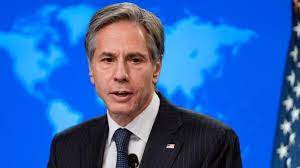America's work in Afghanistan to continue: Antony Blinken
Tue 31 Aug 2021, 10:20:02

Ahead of the Tuesday deadline for the withdrawal of US forces from Afghanistan, Chinese Foreign Minister Wang Yi and US Secretary of State Antony Blinken discussed on Sunday the deteriorating situation in Afghanistan which has been under the spell of attacks and counter attacks in recent days.
During the telephonic conversation held at the US request, Wang told Blinken that the Afghanistan situation has undergone fundamental changes and it is necessary for “all parties” to make contact with the Taliban and “guide it actively”. In his second phone conversation with Blinken in two weeks,
Wang said that the US, in particular, needs to work with the international community to provide Afghanistan with urgently needed economic, livelihood and humanitarian assistance and help the new Afghan political structure maintain normal operation of government institutions and maintain social security and stability.
Amidst chaotic airlifts of Afghan civilians and diplomats by the US and NATO countries before the August 31st deadline, Wang warned Blinken that the “hasty withdrawal” of international troops could allow terrorist groups to “regroup and come back stronger”. Wang and Blinken also discussed bilateral ties which were riddled with tensions over a host of issues.
Blinken, according to a Chinese Foreign Ministry statement, told Wang that Washington believes that the United Nations Security Council (UNSC) should speak in a “clear and unified voice” to show that the international community expects the Taliban to ensure the safe evacuation of foreign citizens in the aftermath of the US withdrawal. Blinken
added that the UNSC should also be unified in telling the Taliban to “guarantee that Afghan territory cannot become a hotbed of terrorist attacks or a safe haven for terrorism”.
added that the UNSC should also be unified in telling the Taliban to “guarantee that Afghan territory cannot become a hotbed of terrorist attacks or a safe haven for terrorism”.
China so far has said that the Taliban, an Islamist group that seized Kabul earlier this month after being ousted by US-led forces in 2001, should establish a political structure that lays the foundation for lasting peace in Afghanistan. China has been warming to the Taliban, to seek assurances to reign in separatist forces in China's Uyghur Muslim dominated region of Xinjiang, which shares a border with the war-torn country.
Beijing has been concerned that confusion in Afghanistan could provoke terrorism in the Xinjiang Uygur Autonomous Region, where under growing state surveillance, many have been detained under a "re-education" campaign. China has been accused of human rights violations in the region due to these detentions.
On China-US relations, The Chinese Foreign Minister said that dialogue is better than confrontation and cooperation is better than conflict, and that the Chinese side will consider how to engage with Washington based on its attitude towards Beijing.
If the US side also hopes to bring bilateral relations back on the right track, it should stop blindly smearing and attacking China, and stop undermining China's sovereignty, security and development interests, Wang added. Their conversation followed the first round of high-level military talks after US President Joe Biden came to power in January during which the two sides discussed the rapidly evolving situation.
No Comments For This Post, Be first to write a Comment.
Most viewed from International
Most viewed from World
AIMIM News
Latest Urdu News
Most Viewed
May 26, 2020
Do you think Canada-India relations will improve under New PM Mark Carney?
Latest Videos View All
Like Us
Home
About Us
Advertise With Us
All Polls
Epaper Archives
Privacy Policy
Contact Us
Download Etemaad App
© 2025 Etemaad Daily News, All Rights Reserved.

.jpg)
.jpg)
.jpg)






.jpg)


.jpg)
.jpg)
.jpg)
.jpg)
.jpg)
.jpg)
.jpg)
.jpg)
.jpg)
.jpg)
.jpg)
.jpg)

















